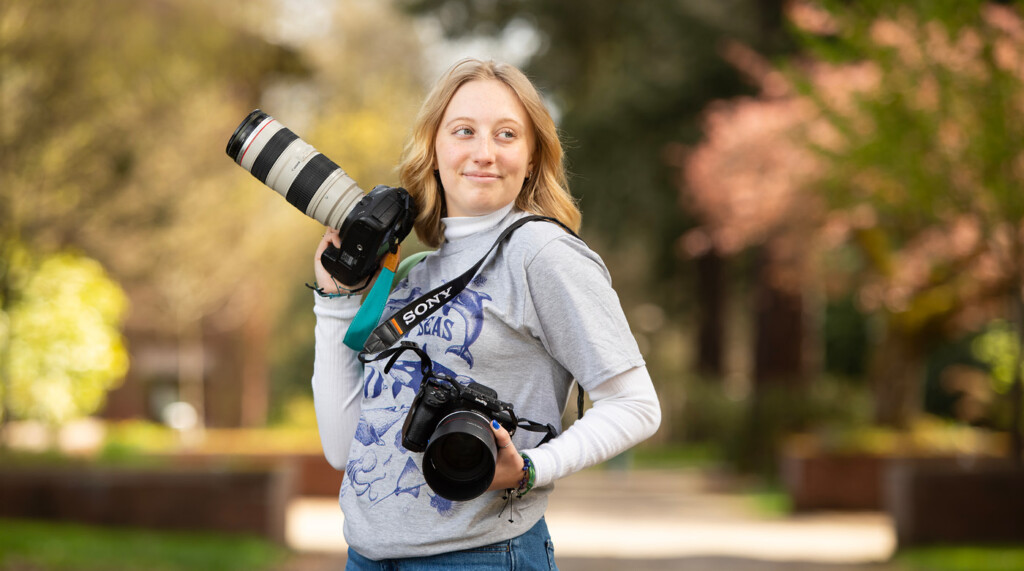Page 327 • (4,302 results in 0.071 seconds)
-
studies, the duo surveyed the animals from treetop platforms, and outposts on the ground, where they learned how to predict and dodge rhinos–a species that “can be very ornery,” he says. This stint lasted around six weeks. From there, the duo embarked on a series of hikes into the Nepalese mountains, each one lasting about three weeks and topping out at around 18,000 feet of elevation, a sublime conclusion to a sometimes meditative, oftentimes unsteady, and always worthwhile leave of absence
-

College, MIT, and Harvard. Read Previous New Director of Jazz Studies, Cassio Vianna Read Next PLU Trumpet Ensemble live on KING-FM LATEST POSTS PLU’s Director of Jazz Studies, Cassio Vianna, receives grant from the City of Tacoma to write and perform genre-bending composition April 18, 2024 PLU Music Announces Inaugural Paul Fritts Endowed Chair in Organ Studies and Performance January 29, 2024 PLU’s Weathermon Jazz Festival to Feature Acclaimed Musician Aubrey Logan February 28, 2023 Horn & Fixed
-
District.Asieh Mahyar Passionate about performing music from different cultures, Prof. Asieh Mahyar is the interim Director of Orchestral Studies at Pacific Lutheran University where she conducts the PLU Symphony Orchestra. Ms. Mahyar is a candidate in Doctor of Musical Arts in Orchestral Conducting at Michigan State University, where she studied with Octavio Más-Arocas and Katherine Kilburn. She received her MM in Orchestral Conducting from University of Massachusetts-Amherst under the mentorship of
-

writing three scenes, and with the help of some PLU singers and software simulating an entire orchestra, they got to hear some of their work. “She was very intrigued with the music,” Youtz said. They decided to stop in the face of uncertainty. “Why would you write an entire opera if you don’t have a performance in mind?” Youtz pointed out. “That would be a lot of work, and maybe for nothing.” But then James Brown, chair of vocal studies and director of PLU’s opera programs, started talking with Youtz
-

requirements, Tamara Williams and Joel Zylstra — directors of the Wang Center for Global and Community Engaged Education and the Center for Community Engagement and Service, respectively — found that some students were already completing the program just based off their majors. “It was global studies, environmental studies and Hispanic studies,” Zylstra said. “When there is overlap like that it’s kind of like ‘why not?’” Zylstra and Williams were approached by the Peace Corps in 2015, in an effort to reach
-

Emma Stafki ’24 explores the challenges facing Puget Sound orcas in capstone documentary Posted by: Zach Powers / April 29, 2024 Image: Emma Stafki ’24 is a communication studies major from the Key Peninsula. (Photo by Sy Bean/PLU) April 29, 2024 By Lora ShinnPLU Marketing & Communications Guest Writer Emma Stafki grew up on Washington’s Key Peninsula, hearing stories about a tragedy in 1968. In nearby Vaughn Bay, her grandparents witnessed the heartwrenching capture of Hugo, a three-year-old
-

contributors (10 from PLU) working on replications of eight highly cited psychological studies, it’s a major undertaking with international implications—and a multifaceted mission. CREP (rhymes with “grape”) not only helps validate psychological research findings; it also allows undergraduate students to engage in potentially publishable research. “Most student projects, the data go nowhere,” Grahe said. “In my classes I’ve always tried to get undergrads to do projects that might be publishable, but the
-

travel and interning for a conservation nonprofit. But now, she says, serving as a park ranger feels like the perfect fit. “I really love working for the Park Service because it’s an organization I can really believe in,” Plog said, “tasked with preserving places for future generations and also making sure people can enjoy them now. I love being part of that.” Plog, who is currently working at Yosemite National Park in California, double majored in communication and global studies at PLU. She also
-

, research methods, materials and data are shared digitally around the world to tackle inquiries. Why is this important? Traditional research can yield low replicability of previous studies. This suggests—in part— questionable research practices, including manipulating data to fit hypotheses and desired results, or worse yet, data fabrication. A “replicability crisis” (i.e., the inability to replicate earlier research findings), is addressed with open science practices. Benefits of open science include
-
About PLUPacific Lutheran University (PLU) was founded in 1890 by a group of mostly Scandinavian immigrants. PLU is committed to the integration of liberal arts studies and professional preparation. PLU is the only university rated within the top 15 of all Western region Master’s universities every year since the first “Best College” survey published annually by U.S. News and World Report. Scholarships are available to most International students. Location PLU is located in the quiet suburb of
Do you have any feedback for us? If so, feel free to use our Feedback Form.


